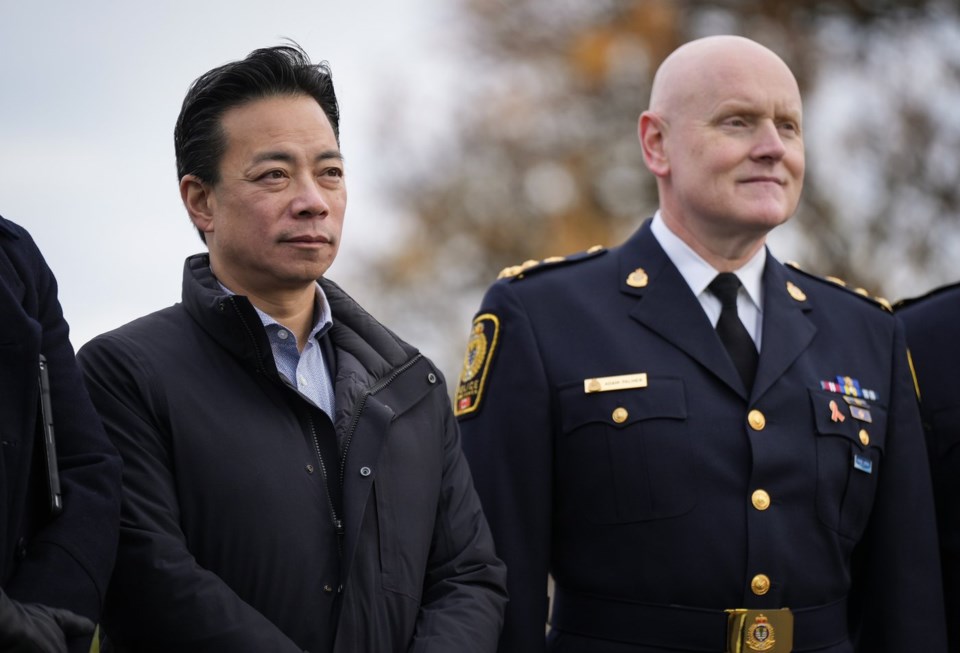VANCOUVER — Vancouver's Downtown Eastside neighbourhood is in the grip of a "humanitarian crisis" of crime and violence that has reached a tipping point, Mayor Ken Sim said as he unveiled a taskforce to tackle organized crime.
Sim stood alongside Vancouver police Chief Adam Palmer to announce what the mayor called a "long-term, sustained effort to disrupt criminal networks, hold offenders accountable and make our streets safer."
The city said Task Force Barrage will expand tactics that bring together police, fire, bylaw officers, sanitation crews and engineering teams to ensure sidewalks are clear and safe for residents, workers and visitors.
Sim said the status quo isn't working in the neighbourhood, and criminal gangs, drug traffickers and repeat offenders are preying on the most vulnerable who live there.
"For years, hundreds of millions of dollars have been poured into the Downtown Eastside, a small, four-square-kilometre area, without delivering meaningful, lasting change," said Sim.
He said the task force represented a different approach.
Sim said the operation would cost $5 million, but it was "the best investment" the city could make and failing to spend the money would end up costing many times more.
Palmer said 38 officers would be deployed to get Task Force Barrage running, and Vancouver residents would immediately see more uniformed officers patrolling on foot in the Downtown Eastside.
He said there would be three core strategies: deploying officers on the streets, launching more complex investigations to target crime, and enhancing community partnerships to improve public safety.
"The primary function will be to target chronic offenders, to arrest people with outstanding warrants and people breaching their bail conditions, to drive out drug traffickers linked to street violence and organized crime who prey on the most vulnerable members of our community," said Palmer.
He said Downtown Eastside residents were "at an exponentially higher risk to be the victim of violent crime."
Palmer pointed to a measure called the crime severity index, which Statistics Canada says reflects crime levels weighted to their seriousness.
Palmer said Vancouver's index in 2023 was 97, Canada-wide it was 80.5, while in the Downtown Eastside it was 524.
Sim said that the focus on crime "isn't just about public safety."
"This is a humanitarian crisis, and the situation in the Downtown Eastside has reached a tipping point. Today we take the first step towards ending the cycle of violence," he said.
Sim said policing alone isn't the answer, but it's part of the solution and he's urging other levels of government to help with the effort.
The mayor had unveiled a plan last month to revitalize the Downtown Eastside, which included a freeze on construction of new supportive housing units in Vancouver in favour of fixing the current aging housing units in the area.
Vancouver Coun. Pete Fry said he had lived in the Downtown Eastside for more than 30 years, and there were gaps in the mayor’s "reactive" approach.
He pointed to the freeze on supportive housing and a failure to address "systemic health issues" that more police would not solve.
"We know that there's needs in the Downtown Eastside in addition to policing. I'm not criticizing necessarily a more law-enforcement approach. But where are the places for people to go?"
Calling some existing supportive housing "absolutely disgusting" and "horrendous," Sim said Thursday he would bring forward a council motion on the freeze at the end of the month.
"It's an unsustainable situation and too many of our existing supportive housing are in shocking condition with broken elevators, garbage everywhere, open drug use, infestations and unsanitary living conditions," said Sim.
He added that the city doesn't want people to rebuild their lives in crumbling environments.
This report by The Canadian Press was first published Feb. 13, 2025.
Nono Shen, The Canadian Press



